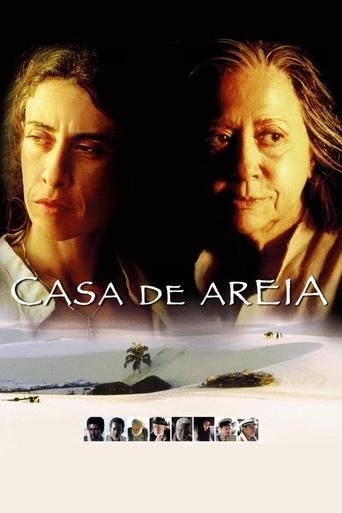Bellfire32
This movie didn't make sense at all. My rule is if it's not a comedy and it's move funny than dramatic then it's not serving it's purpose. It was like Gilligan's Island gone horribly wrong. First of all; why couldn't they get one person to take them away years before the daughter became grown. The first mother came their with her husband but couldn't get out, that was kind of understandable. The daughter grew up and had a child of her own, a girl, and she couldn't get anyone to drive her into town. I don't get why the plot was about her 59 years like her mother didn't exist. The daughter/grand-daughter was a trip and she gave the movie it's comedic edge but there's were the problem comes to light.Everything she did was wrong and wouldn't have been fun if the movie was good and made sense. It hurt the film when the lady that first played the Grandma was used to play the mother and the young woman used to play the daughter played her own daughter.
Howard Schumann
Set in the white desert of Maranhao in Northern Brazil where drifting sands can ruthlessly bury an entire house in a matter of minutes, Audrucha Waddington's House of Sand is reminiscent of Teshigahara's great 1964 film Woman in the Dunes but without its dramatic tension or emotional involvement. In House of Sand, there is no struggle for survival against nature or a pervasive feeling of being trapped, only ennui and grudging acceptance, interrupted by casual sex. Based on a story co-written by Elena Soarez and Luiz Carlos Barreto, the film follows three generations of women but confuses the viewer with sudden, unannounced time shifts and interchanging roles played by the lead actresses.In 1910, Aurea (Fernanda Torres), her husband Vasco de Sa (Ruy Guerra), and her mother Dona Maria (Fernanda Montenegro, the real mother of Ms. Torres) travel with other settlers to a remote desert outpost to set up camp on the land he had purchased. Aurea is pregnant and immediately wants to return home after they are approached by black slaves who carry machetes. The settlers soon depart in fear leaving the two women at the mercy of Vasco who has become increasingly brutal and unstable. After Vasco is killed by a falling roof, the two women try to adjust to the harsh life of the desert but look for a way to leave.Their first ray of hope is from salt deliverer Chico (Emiliano Queiroz), from the neighboring area but he dies suddenly from a cough, As the years go by, Aurea's daughter (Camilla Facundes) named Maria after her mother, is now ten years old. The women have been helped to survive by a former slave named Massu (Seu Jorge), now a widower, who teaches them how to get food. Another chance to leave occurs when Luis (Enrique Díaz), a soldier who has come to the desert with a group of scientists to photograph the solar eclipse of 1919, tells Aurea that he will take them out of the desert but fate intervenes. When Aurea returns to get her mother and daughter, she finds that her house has collapsed, killing her mother, though Massu has rescued Maria.Accepting their fate, the two abandon hope of ever leaving the desert, though the story does have a surprise in store for us at the end. House of Sand's camera-work is astonishing with gorgeous shots by cinematographer Ricardo Della Rosa not only of the white sand but also of the pristine sky and the blue sea but the characters never seem to notice the world around them and express no relationship, either emotional or spiritual, to their surroundings. Apart from the visuals, the film has little to say other than -- time goes by and it's not too interesting when you're alone but you can get used to anything and anyway, men come and go but the strength of women endures. All we need is an ersatz ghost to put us in Almodovar territory.
wondernat
Con: really slow. I admit I fast-forwarded through most of the panoramic shots. (The desert of Maranhao is beautiful, but there's only so much scenery a person can stand in a 5-minute span.) The end - albeit extremely cute and touching - was too slow for my taste. Pro: even the most impatient won't find the slow progression that much a burden, thanks to the great dynamic of real-life (and on-screen) mother and daughter, Montenegro and Torres. It's a movie you watch to appreciate the cinematography, the great acting, and non-formulaic pleaser.The supporting cast was nothing short of great, which complemented quite nicely with Torres and Montenegro as they stole each scene with the fluidity of their acting.
angel_a-2
I loved this movie because it is fully of truthful contrasts. The larger story portrays the passing of time and immense global changes through war, scientific and technological advances. Everything changes, yet stays the same. Regardless of the generation, youth longs for excitement and change, while time brings calmness and acceptance of circumstance. The most amazing part is all is that the passing of time is portrayed from within an oasis in the middle of sand dunes where the sands of time pass slowly yet surely. This contrast, and the circumstances that bring the characters there, leave the audience wondering witch they would choose, the simple, calm, and relaxed life of the sand, or the stressful, competitive, yet object filled life in the city.It's important to stay sharp to catch the change in generations because the actresses remain the same throughout, but this only adds to the story's message once you figure it out. I gave it a 10



